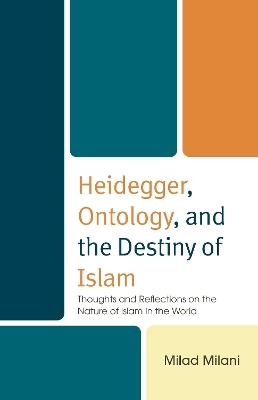
Heidegger, Ontology, and the Destiny of Islam
Thoughts and Reflections on the Nature of Islam in the World
Seiten
2024
Lexington Books/Fortress Academic (Verlag)
978-1-6669-6533-9 (ISBN)
Lexington Books/Fortress Academic (Verlag)
978-1-6669-6533-9 (ISBN)
This book argues that Islam is at risk of losing itself through the process of modernity. It is ironically the lessons of modernity that can save it: a return to origins without a negation of meaning and embracing the project of hermeneutics with deference for the classics.
Heidegger, Ontology, and the Destiny of Islam: Thoughts and Reflections on the Nature of Islam in the World critiques Islam as a phenomenon set into motion from its beginning. It is a reflective work that addresses difficult questions about Islam through familiar historical concerns and grapples with the issues that arise in that process. Notably, it attests to making no substantive claims about Muslims and instead keeps to the course of analysis of the phenomenon that is Islam, which is taken as an assessable entity rather than a categorical construct. Understood largely in light of a history of observable realities, the ontological analysis of Islam reveals the general acquaintance with it to be imperfect. This suggests the reality of Islam is based on a primal truth that is only partially seen. The analysis then confronts two problems: firstly, that Islam is not what its historical “story,” as it were, proclaims and, secondly, that Islam is therefore not what is traditionally made out of the surviving historical narratives. It is not a question of “what” Islam is, but more critically, “how” Islam appears in the world.
Heidegger, Ontology, and the Destiny of Islam: Thoughts and Reflections on the Nature of Islam in the World critiques Islam as a phenomenon set into motion from its beginning. It is a reflective work that addresses difficult questions about Islam through familiar historical concerns and grapples with the issues that arise in that process. Notably, it attests to making no substantive claims about Muslims and instead keeps to the course of analysis of the phenomenon that is Islam, which is taken as an assessable entity rather than a categorical construct. Understood largely in light of a history of observable realities, the ontological analysis of Islam reveals the general acquaintance with it to be imperfect. This suggests the reality of Islam is based on a primal truth that is only partially seen. The analysis then confronts two problems: firstly, that Islam is not what its historical “story,” as it were, proclaims and, secondly, that Islam is therefore not what is traditionally made out of the surviving historical narratives. It is not a question of “what” Islam is, but more critically, “how” Islam appears in the world.
Milad Milani is senior lecturer in religious studies at Western Sydney University, Australia.
Preface
Acknowledgments
List of Abbreviations
Introduction
Chapter One: The Question Concerning Islam
Chapter Two: Reflections on Aspects of Islam
Chapter Three: Reciprocity and Retributive Logic
Chapter Four: Crisis, Impasse, and Classics
Chapter Five: Into the Future of Islam
Conclusion
Bibliography
About the Author
| Erscheinungsdatum | 16.08.2024 |
|---|---|
| Reihe/Serie | Lexington Studies in Islamic Thought |
| Zusatzinfo | 2 BW Illustrations |
| Sprache | englisch |
| Maße | 160 x 237 mm |
| Gewicht | 440 g |
| Themenwelt | Geschichte ► Teilgebiete der Geschichte ► Religionsgeschichte |
| Geisteswissenschaften ► Religion / Theologie ► Islam | |
| ISBN-10 | 1-6669-6533-2 / 1666965332 |
| ISBN-13 | 978-1-6669-6533-9 / 9781666965339 |
| Zustand | Neuware |
| Informationen gemäß Produktsicherheitsverordnung (GPSR) | |
| Haben Sie eine Frage zum Produkt? |
Mehr entdecken
aus dem Bereich
aus dem Bereich
Von den Anfängen bis zur Gegenwart
Buch | Hardcover (2022)
C.H.Beck (Verlag)
34,00 €
Herkunft, Blüte, Weg nach Osten
Buch | Hardcover (2024)
C.H.Beck (Verlag)
39,00 €


